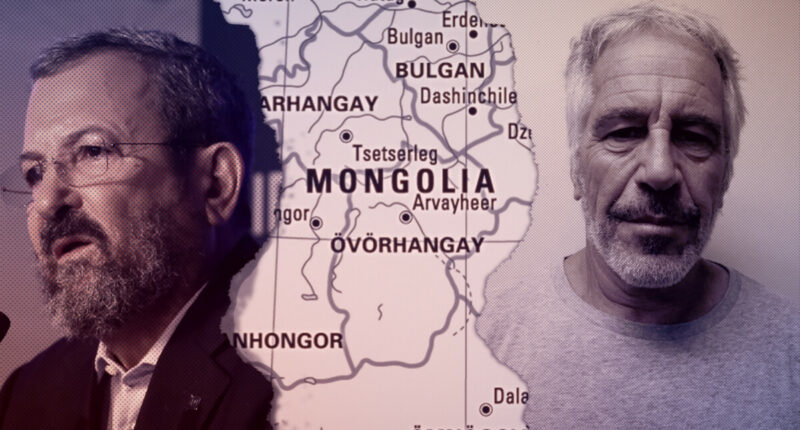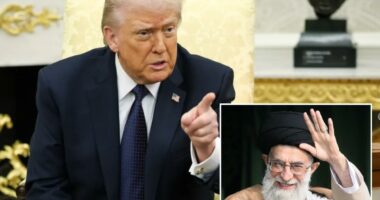Share this @internewscast.com
Epstein planned Ehud Barak’s meeting with the Secretary of the National Security Council of Mongolia.
It’s now confirmed that Jeffrey Epstein had the capability to influence global power at top levels. Leaked emails from former Israeli Prime Minister Ehud Barak reveal Epstein as a key figure behind closed doors, leveraging his influential network and financial resources to help negotiate a security and technology pact between Israel and Mongolia.
Epstein’s Network Reaches Ulaanbaatar
Epstein’s relationships with Israeli leaders such as Barak and Ehud Olmert were known, alongside his contributions to Israeli organizations like Friends of the IDF. However, these emails, unveiled by the hacking group Handala, possibly connected to Iran, and shared via Distributed Denial of Secrets, provide clear proof that Epstein played an integral role in facilitating a significant state-level agreement, culminating in a formal bilateral security contract.
The disclosed material includes photos and documents from 2013 to 2016, illustrating daily exchanges between Barak and Epstein, where Epstein orchestrated Barak’s engagements with Mongolia’s top officials.
Orchestrating State Security
In April 2013, just a month after leaving his position as Israel’s Defense Minister, Barak visited Mongolia to meet with President Tsakhiagiin Elbegdorj and key security personnel. Epstein was the mastermind behind this trip, managing logistics, introductions, and overall strategy. The emails indicate Epstein’s crucial role in arranging Barak’s crucial meeting with Enkhtuvshin Tsagaandari from Mongolia’s National Security Council. During this significant meeting, the CEO of Israel Weapon Industries presented a customized Jericho pistol, forging stronger ties and paving the way for increased collaboration.
Barak’s Official Offer: Spying Tech for Mongolia
Israel’s efforts extended beyond diplomatic gestures and gifts. Ehud Barak submitted a formal Israeli memorandum to Terje Rød-Larsen, the president of the International Peace Institute, proposing advanced surveillance technology, electronic monitoring, and intelligence support for Mongolia. Notably, the document carried Israel’s official emblem beside Barak’s name, underscoring the official nature of the proposal and requiring approval from the Israeli Minister of the Interior.
Barak’s memorandum also included commitments for support in sectors like modern agriculture, water management, and medical diagnostics. At the same time, Barak negotiated deals with Israeli biotech and mining companies, highlighting the intertwined nature of political strategies and private financial interests.
Epstein, the Mongolia Advisory Board, and Global Power Brokering
The “advisory team” concept in Mongolia wasn’t organic; it was proposed by Terje Rød-Larsen (president of IPI and prominent Oslo Accords mediator), another figure deep within Epstein and Barak’s network. Barak, Rød-Larsen, and even Lawrence Summers (former Harvard president and U.S. Treasury Secretary) were tapped by Epstein to serve on the “Mongolia Presidential Advisory Board” with each reportedly earning up to $100,000 for their efforts.
Their inaugural meeting—at Davos, naturally—included the Mongolian President, National Security Advisor, and Rød-Larsen, with Epstein joining as “financier”[meeting notes PDF]. Advice flowed on everything from creating a Mongolian sovereign wealth fund to importing Israeli “zero-click” cyber-surveillance capability.
Epstein’s Payouts, Paybacks, and Side Deals
Emails reveal Barak soliciting Epstein’s help for payment, with Rød-Larsen eventually signing off on $100,000 to Epstein from IPI funds earmarked for the Mongolia board. Follow-up communications show further efforts to compensate Epstein—even offering him another’s share when ex-Australian PM Kevin Rudd refused payment.
At the same time, Epstein brokered a $1 million loan to Barak to help finance Reporty (now Carbyne), an Israeli startup offering emergency dispatch and surveillance tech—demonstrating again how personal, state, and commercial interests endlessly overlapped.
Fallout, Denials, and Damaged Reputations
Rød-Larsen was forced to resign as IPI president in 2020 after it emerged Epstein had loaned him money—a fact the IPI tried to distance from organizational activities. Subsequent audits revealed more than $650,000 in donations from Epstein-linked entities to IPI between 2010 and 2019.
Barak, for his part, adamantly denies knowledge of Epstein’s sex trafficking, insisting their relationship was mostly business and occasional “unique” personal friendship—a version of events that grows harder to believe with each new email leak.
A New Blueprint for Influence
What these revelations make clear is that Epstein operated, not just as a financier or criminal, but as a geopolitical go-between—altering the relationships between states by leveraging his financial and political cachet. His work on Israel’s Mongolia deal, via Barak, the International Peace Institute, and a web of tech executives, shows how deep the reach of private intelligence and unofficial diplomacy really goes.

















